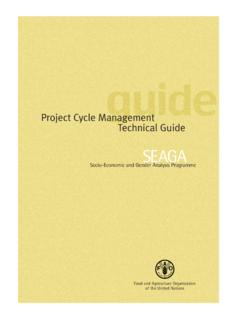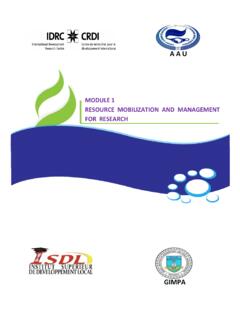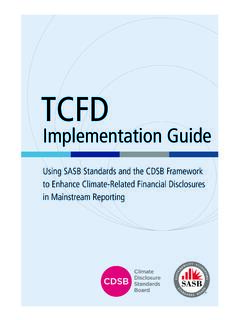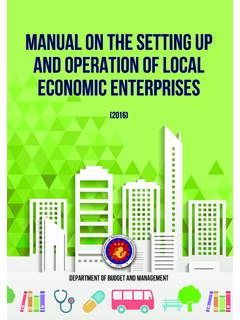Transcription of Guide to developing the Programme Business Case - GOV.UK
1 Guide TO developing THE Programme Business CASEBETTER Business CASES: for better outcomes2018 Crown copyright 2018 This publication is licensed under the terms of the Open Government Licence except where otherwise stated. To view this licence, visit or write to the Information Policy Team, The National Archives, Kew, London TW9 4DU, or email: we have identified any third party copyright information you will need to obtain permission from the copyright holders publication is available at enquiries regarding this publication should be sent to us at 978-1-5286-0461-1 CCS0518648068-2 Guide TO developing THE Programme Business CASEBETTER Business CASES: for better outcomes2018iGuide to developing the Programme Business case ContentsForeword iiiEditor s Note vChapter 1. Introduction 1 What is a Programme ?
2 1 How does a Programme align with the strategic planning process? 2 What is the importance of the Programme Business case using the Five case Model? 3 What is Programme Assurance? 5 Chapter 2. An Overview of the Five case Model 9 Introduction 9 The Strategic case 9 The Economic case 10 The Commercial case 11 The financial case 11 The management case 12 Chapter 3. The Strategic Assessment 13 Introduction 13 Step 1: Determining the strategic context 13 Checklist for Step 1 14 Chapter 4. Preparing the Strategic case 15 Introduction 15 Step 2: Making the case for change 15 Action 2: Agree strategic context 15 Organisation Overview 15 Alignment to existing policies and strategies 16 Action 3: Determine spending objectives, existing arrangements and Business needs 16 Determining existing arrangements 17 Identifying Business needs 18 Action 4: Determine potential Business scope and key service requirements 18 Action 5: Determine benefits, risks, constraints and dependencies 19 Identify the main risks 20 Identify the constraints 21 Identifying the dependencies 21 Workshop 1 case for Change 22 Chapter 5.
3 Preparing the Economic case 25 Introduction 25 Step 3: Exploring the preferred way forward 25 Action 6: Agree critical success factors for the Programme 25 Action 7: Determine the long-list options and undertake SWOT analysis 26 Identifying options 26iiGuide to developing the Programme Business CaseContentsThe Options Framework 27 Using the Options Framework to identify the long-list 28 Drafting the long-list 33 Action 8: Recommend a preferred way forward 34 Drafting the short-list 35 Workshop 2 Identifying and assessing the options 36 Step 4: Determining potential VfM 37 Action 9 Revisit the short-list 37 Action 10 Prepare the economic appraisals for short-listed options 38 Real or estimated market prices 42 Adjustments required to the values of costs and benefits 42 Presenting the economic appraisals 43 Action 11 Undertake benefits appraisal 44 Action 12 Undertake risk appraisal 45 Action 13 Select preferred option and undertake sensitivity analysis 52 Workshop 3 Assessing the Short-listed Options 56 Chapter 6.
4 Preparing the Commercial case 57 Introduction 57 Step 5: Preparing for the potential Deal 57 Action 14: Determine procurement strategy 57 Action 15: Determine service streams and required outputs 58 Action 16: Outline potential risk apportionment 59 Action 17: Outline potential payment mechanisms 60 Action 18: Ascertain contractual issues and accountancy treatment 62 Workshop Stage 4 developing the Deals 64 Chapter 7. Preparing the financial case 65 Introduction 65 Step 6: Ascertaining affordability and funding requirement 65 Chapter 8. Preparing the management case 73 Introduction 73 Step 7: Planning for successful delivery 73 Action 20: Plan Programme management strategy, framework and plans 73 Action 21: Plan change management strategy, framework and outline plans 75 Action 22: Plan benefits realisation strategy, framework and outline plans 76 Action 23: Plan risk management strategy, framework and outline plans 77 Action 24: Plan Programme assurance and Programme Evaluation strategy, framework and plans 80 Workshop 5 Successful Delivery Arrangements 81 Annex A: Hypothetical case Study showing the relationship between strategy, Programme and projects 83 Annex B: Overview of how to develop the Programme Business case 85 Annex C: Programme Scoping Document 87 Annex D: Programme Business case Review Criteria 91 Annex E.
5 Summary of steps and actions for preparing the Programme Business case 93 Glossary 95 Bibliography 99iiiGuide to developing the Programme Business case ForewordIncreasing demand for public services creates ever more pressure on the public resources available, increasing the need to make better use of these limited resources. The challenge to those preparing and advising on spending decisions has never been greater. In this context, it is vital that spending and investment decisions are based on highly competent professionally developed proposals. This best practice guidance from the Treasury and the Welsh government has been refined and tested over many years, and it provides a clear framework for thinking about spending proposals and a structured process for appraising, developing and planning to deliver best social value for money: all of which is captured through a well prepared Business case to support objective, evidence based decisions.
6 This latest version of the best practice guidance is updated to maintain its alignment with the refreshed Green Book 2018. It provides a practical step by step Guide to the development of Business cases, using the Five case Model in a scalable and proportionate way. It recognises and aligns with other best practice in procurement and the delivery of programmes and projects. Experience has demonstrated that when this guidance is embedded in public sector organisations, better more effective and efficient spending decisions and implementation plans are produced. At the same time the approach when correctly understood and applied provides a more efficient planning and approval process saving between 30% and 40% in time taken and cost of production of Business cases compared with unstructured approaches. The Guide provides a framework for thinking and a process for developing and gaining approval which is flexible and scalable as well as a range of tools that can be applied proportionately to provide clarity in the decision support process.
7 It also provides a clear audit trail for purposes of public accountability. All centrally funded public spending proposals including those subject only to approval by UK Departments or other centrally funded organisations are required to use this approach and the five case model method, as are major programmes and projects considered by the Treasury and Cabinet Office. Colleagues with responsibility for developing proposals should be professionally trained and accredited through the better Business cases Programme established in the beginning of 2014 training in a correct understanding and use of the method has been widely available. Links to access training can be found on the same web page as this Guide and on the Welsh government web pages. We are therefore very pleased to recommend the use of this guidance and the approved training and accreditation to all who are concerned with delivering best social value for money from decisions on the use of public Scholar Shan MorganPermanent Secretary HM Treasury Permanent Secretary Welsh GovernmentvGuide to developing the Programme Business case Editor s NoteThis Green Book methodology brings together the Green Book approach to appraising public value with the Cabinet Office, Infrastructure and Projects Authority (IPA) project assurance, and the latest commercial standards and procurement methodologies from the Crown Commercial Service (CCS).
8 It also supports Treasury spending scrutiny and approval processes. It is best practice methodology and should be used by those responsible for using public resources in developing proposals to scope, analyse, plan, procure and manage delivery to achieve best value. This refreshed edition of the guidance is an updated version of the 2013 edition reflecting the updated Green Book published in March 2018 Programme and Project guidance is published in two separate guides to allow greater clarification of the how the model should be applied in practice when thinking about these two different but related some years, in addition programmes to the UK and Welsh governments the New Zealand Treasury and the States of Guernsey have used the guidance tailored to meet the needs of their processes and governance. Since 2014 there has been a growth in international interest in both the guidance and the professional accreditation scheme and use of the scheme by governments around the world, international ngos and private companies has been growing.
9 The five principles adopted by the G20 in 2018 for the preparation of infrastructure schemes nationally and regionally are the central pillars of the five case mode. To support the international process of professional accreditation and examinations new international editions of the guidance have also been produced and are available separately to these UK are due to Joe Flanagan for origination of the five case model and authorship of the guidance, with whom I have been privileged to work on both this publication and the Better Business Cases accreditation and training Programme . This Programme , jointly run by the Treasury and the Welsh Government, recognises that guidance is necessary but alone is not sufficient to ensure best use of resources. Training and professional accreditation is now widely available, and more information is available at this link. Accreditation is now expected of to all who work in developing practical best value proposals for delivery of public services using the five case who have made contributions to the development of the guidance over the years and to whom thanks are also, due include: Simon Brindle; Paul Nicholls; Dr Courtney Smith; Stefan Sanchez; Phil Saw; The Health Finance management Association (HFMA); Barry Williams and to many other colleagues in HM.
10 Treasury and across the UK civil service whose experience contributed to development of this supplementary Green Book Guidance. Joseph LoweEditor of the Green Book HM Treasury 20181 Guide to developing the Programme Business case 1 IntroductionA Programme management approach and supporting Business case are essential for ensuring the successful delivery of a set of related projects and activities. This guidance has been prepared for: Senior managers and executives responsible for designing, delivering and approving programmes, including Senior Responsible Owners (SROs), Programme directors, Programme managers and Business case practitioners and will also be of interest to: Members of Senior management Boards with responsibility for approving Business cases, and Directors of Finance, Planning and Procurement and others with responsibility for operational aspects of the is a Programme ?A Programme is a series of planned measures, related events and co-ordinated activities in pursuit of an organisation s long-term goals.


















